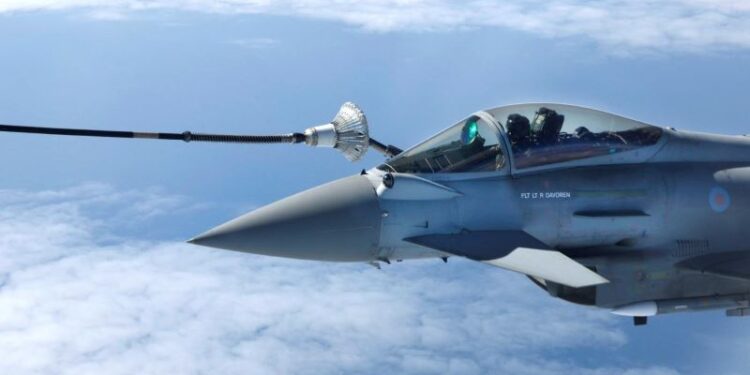Germany on Wednesday agreed to loosen some of its restrictions on weapons sales to Saudi Arabia but is continuing to block deliveries of Eurofighter jets.
German Chancellor Olaf Scholz’s government coalition reached an agreement to allow weapon exports to Riyadh “in specific individual cases”, Scholz’s spokesperson, Steffen Hebestreit, said in a statement, which cited the kingdom’s ceasefire efforts in Yemen.
The conditions for those weapons sales are that the weapons must not be utilised in Yemen and must not be used in relation to potential human rights violations, Hebestreit added.
Scholz said on Wednesday that the agreement does not change Berlin’s position on fighter jet deliveries to Riyadh, which Berlin has blocked.
“I can tell you: a decision on a Eurofighter delivery toward Saudi Arabia is not on the agenda for the foreseeable future,” the chancellor said on the second day of the Nato summit in Vilnius, Lithuania.
A German government source told Politico that there will not be any authorisations to export Eurofighters to the kingdom during this legislative period, which runs until late 2025.
Germany halted arms sales to Saudi Arabia following the killing of Washington Post and Middle East Eye columnist Jamal Khashoggi inside the Saudi consulate in Istanbul in 2018.
But since the thaw between Saudi Arabia and Iran earlier this year, Britain has argued that Germany can no longer block the export of Eurofighter jets to third parties.
Britain’s BAE Systems struck a deal five years ago for the arms maker to supply 48 of the jets in question, but a third of the components for the jets come from Germany.
Saudi Arabia already has 72 Eurofighters, a fighter aircraft that is jointly developed by the multinational Airbus, Britain’s BAE Systems, and Italy’s Leonardo.
A Saudi Arabia-led coalition, which included the United Arab Emirates, intervened on behalf of the Yemeni government in March 2015 to push back the Houthis who had seized control of Yemen’s capital the year prior.
Coalition air strikes killed thousands of civilians, according to UN reports, while the Houthis launched missiles and drones at civilian infrastructure in Saudi Arabia and the UAE.
A UN-brokered truce that ended late last year is still mostly holding, giving long-awaited respite to Yemenis.
Source: Middle East Eye






 WhatsApp us
WhatsApp us 

